Paul Walter Hauser Richard Jewell
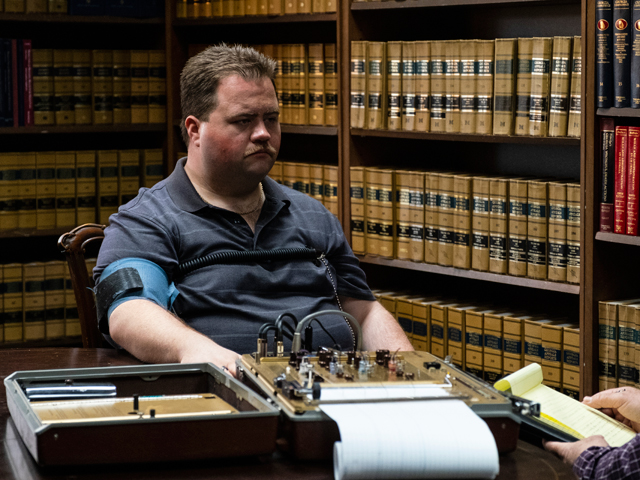
The World Will Know His Name… And the Truth
Cast: Kathy Bates, Jon Hamm, Sam Rockwell, Olivia Wilde, Nina Arianda, Paul Walter Hauser
Director: Clint Eastwood
Genre: Drama
Synopsis: "There is a bomb in Centennial Park. You have thirty minutes." The world is first introduced to Richard Jewell as the security guard who reports finding the device at the 1996 Atlanta Games bombing"his quick thinking making him a hero whose swift actions save countless lives. But within days, the law enforcement wannabe will become the FBI's number one suspect, vilified in the court of public opinion, his life ripped apart.
Richard Jewell
Release Date: February 13th, 2020
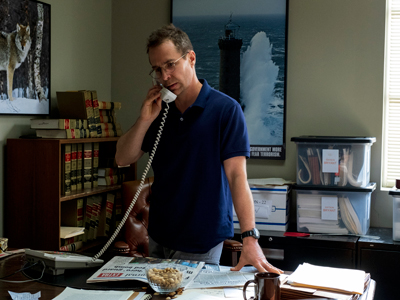 About The Production
About The Production
BRYANT
Richard, you're a national hero now.
RICHARD
Thank you, sir, but I was just doing my job.
On July 27, 1996, in the middle of the Atlanta Games, security guard Richard Jewell discovers a suspicious backpack, hidden under a bench, that is soon found to contain an incendiary device.
With little time to spare, he helps evacuate the area, saving many lives and minimizing potential injuries. He is hailed a hero. But just three days later, the humble savior's life unravels when he"and the world"learn he is the FBI's prime suspect in the bombing.
What might read as the makings of a suspense thriller are not the imaginings of a creative mind, but were, in fact, the life-shattering reality for the real Richard Jewell. Ironically, thanks to his selfless act, for 88 days, Jewell lived with an invasive FBI investigation, public scrutiny spurred by unrelenting press coverage, and the uncertainty that his name would ever be cleared, or his life ever be the same.
Director/producer Clint Eastwood was intrigued enough to dramatize for the big screen the tragic story of this trusting man whose life was turned upside down by both the media and the law enforcement community he idolized. "We often see stories about powerful people getting accused of something, but they have money, get the right attorney, and escape prosecution," he says. "I was interested in Richard Jewell's story because he was the common man, the average person. He was never prosecuted, but he was in every way persecuted. There was this rush to judgement to accuse him, and he didn't have any power to escape it and was, for a long time, too naively idealistic to see he needed to save himself.
"That's why I wanted to make this picture," he continues, "to restore Richard's honor. Because it's the everyday guy"who wants to be a police officer, of all things, to devote himself to the betterment of mankind"who does this heroic thing and then pays a heavy price for it. He gets thrown to the wolves."
Whether or not the public at large is aware of Richard Jewell's innocence, most today still refer to him as the Atlanta bomber, despite his having been cleared. "People don't put it together," the director adds. "They don't connect that the real bomber showed up six years later, that he confessed, and that they got him. I hope audiences learn that from this picture, but that they also learn that, as a society, we can do better. If that's a lesson Richard can give us, I think that's great. That's a hero."
Eastwood's production banner, Malpaso, had been circling the project for a few years. In fact, says producer Tim Moore, "We were scouting for another project in Hawaii, and when I came back, Clint said, 'You might want to take that Hawaiian shirt off; we're going to Atlanta to do the Richard Jewell story. The time to make it is now, it's a story that needs to be told.' All of a sudden, we were in Atlanta prepping for production."
Producer Jessica Meier adds, "Clint felt it was important because even though it happened over 20 years ago, it could still happen today. Anybody can be taken down in two seconds by a quick statement, true or not."
The filmmakers sorted through a vast amount of research in determining the story they could tell within the framework of a single film. "There was an amazing amount of information," Meier relates, "but we focused on Richard's point of view and his partnership with his attorney Watson Bryant"the first person apart from his mom to believe in him"because that's what we found most compelling."
Screenwriter Billy Ray, who penned the script, says, "I've always wanted to write for Clint "I think every writer feels that way"but especially on a movie like this because it concerns the kinds of themes that Clint has been exploring his entire career: justice, the power dynamics of American law enforcement, the ordinary man in an extraordinary circumstance. It was just a perfect marriage of director and material."
Ray based his work on a 1997 Vanity Fair article by Marie Brenner. The journalist, who was on-site in the aftermath and spent time with Richard, his mother, Bobi Jewell, and Watson Bryant, recalls, "In 1996, law enforcement was enthralled by the profiling theory, so amidst the frenzy that would have been going on at the bureau after the bombing, they looked at this very sweet, slightly oddball guy who found the device and thought, 'Oh, it's the lone bomber theory!' It then became a witch hunt"a term that is overused in our culture but is the very definition of what happened to Richard; he and Bobi were under severe pressure and really coming undone. Then and now, our society is so quick to make assumptions about people based on how they look or how a series of actions appears from the outside, without trying to see inside someone's heart.
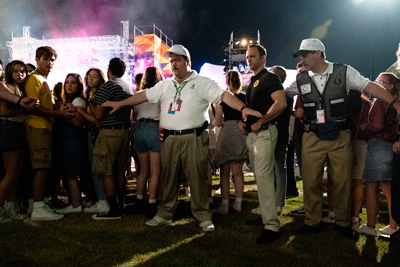 "My time in Atlanta, and what happened to Richard, had a profound effect on me as a reporter," she continues. "It is rare when a story inhabits you in this way and even rarer when you remain in contact with those you have reported on. Seeking justice for this man became a mission for me, to get their story told by a filmmaker of immense talent and in the most powerful way."
"My time in Atlanta, and what happened to Richard, had a profound effect on me as a reporter," she continues. "It is rare when a story inhabits you in this way and even rarer when you remain in contact with those you have reported on. Seeking justice for this man became a mission for me, to get their story told by a filmmaker of immense talent and in the most powerful way."
When Brenner learned Eastwood was interested in telling the story for the big screen, she thought, "I was stunned and absolutely elated. It was, for me, an almost unimaginable fever dream that, 23 years after the bombing, an icon who cares so deeply about the rights of the unseen heroes among us had chosen to utilize his gifts to tell this story, to at long last bring justice to Bobi and Richard Jewell."
Though there was no proof of wrongdoing, Jewell had several strikes against him, including the fact that he fit the FBI's general profile and had discovered the device. Law enforcement compared him to criminals in similar, recent cases, and also learned that Jewell had made a few mistakes at his prior jobs and held that against him.
"Everybody wanted to solve the case and there was competition between the different outlets and agencies, to be first and foremost," Eastwood notes. "A lot of good organizations failed to handle things well when it was all first happening, and the dilemma was that if they didn't get somebody quick and solve the case, the whole Games event would collapse, and they'd lose millions of dollars-worth of preparations that had already been made."
Since Jewell was considered a suspect, he experienced public incrimination that, through the lens of history, has never been publicly reversed, despite being fully exonerated after those long, trying 88 days, and someone else ultimately confessing to the crime.
Eastwood states, "This is a story that is both true, but also has suspense and somebody the audience can root for."
To play the lead roles, the filmmaker cast Sam Rockwell as attorney Watson Bryant, Kathy Bates as Bobi Jewell, Jon Hamm as the lead FBI investigating agent, Tom Shaw (a fictionalized character), Oliva Wilde as reporter Kathy Scruggs, and Paul Walter Hauser as Richard Jewell.
RICHARD
I wanna help you fellas.
I'm law enforcement, too, same as you.
Casting
In the movie, the moment Richard is publicly named a suspect in the bombing the media and the public are eager to jump on the bandwagon, despite a glaring lack of anything more than circumstantial evidence against him. And while most people would innately jump to defend themselves, Richard, certain of his innocence and, more importantly, staunch in his beliefs in respecting the legal system, misplaces his trust in his accusers.
Paul Walter Hauser, who plays the titular role in the film, states, "It's an underdog story in a sense. Richard is a wannabe cop who has worked security and worked for a sheriff but has never really been respected the way he wants to be, the way he respects authority. This moment"when he saves the lives of hundreds of people at the Centennial Park concert"starts out as a moment of glory. He thinks he finally has earned that respect, though even then he remains self-effacing. But in a dark twist of fate, he's put on the chopping block instead. Things go from bad to worse very quickly because he refuses to believe the police and the FBI won't clear him, simply because he knows he's not guilty.
"As an actor," he continues, "I liked that the script showed the ins and outs of the investigation, the unconscionable way he was treated, and redemption for this one man who had his entire life altered, if not ruined, by those tragic circumstances."
Hauser worked hard to capture Jewell's mannerisms and speech, wanting to do justice to the man and those who knew him. "The filmmakers gave me clips and archival footage to watch, and that, along with Marie's article and the screenplay and, of course, meeting Bobi and Watson, was plenty," he says. "It's a privilege to memorialize someone like Richard, but you don't want to do an impersonation, you just want to evoke the aura of them at that place and time. At the end of the day, I really just looked at Richard and tried to capture his voice, his spirit, his 'gentle giant' quality, and the fact that he was a bit of a Boy Scout who believed in the system. He was so well-meaning"it's hard to believe people like him exist, sometimes"and I think that's why you want to root for him, in life and hopefully on the screen."
Along with wanting to tell Jewell's side of the story, the actor was also eager to take the role because, he says, "I've always wanted to work with Clint Eastwood, and now, having done so, I can see why actors love him. He's charming, he's smart, and he knows what movie he's making. He has a vision, for sure. He's the boss, you look to him for any and all points of wisdom, collaboration and insight. But at the same time, he gives you a long leash, he wants you to interpret your character. And he really trusts you in a grand way that I felt very honored by."
Eastwood remarks, "I've been lucky to have a few films along the way where everything fell into place, and Paul was born to play this role. He's a terrific actor. He got his demeanor down, and portrayed Richard as the hardworking, ingenuous guy he was."
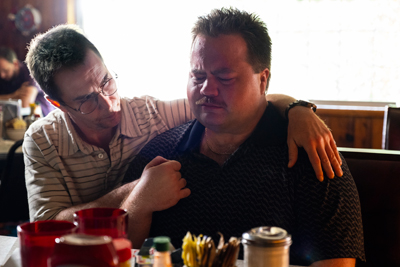 When Richard finds that he needs legal advice, he reaches out to the only attorney he knows, whom he befriended during a brief stint as an office mail clerk years prior: independent, antiestablishment lawyer Watson Bryant. Though it's been perhaps a decade since the two have spoken, Bryant remembers Richard nonetheless as the sweet kid who kept him supplied with Snickers bars.
When Richard finds that he needs legal advice, he reaches out to the only attorney he knows, whom he befriended during a brief stint as an office mail clerk years prior: independent, antiestablishment lawyer Watson Bryant. Though it's been perhaps a decade since the two have spoken, Bryant remembers Richard nonetheless as the sweet kid who kept him supplied with Snickers bars.
Sought-after actor Sam Rockwell, who portrays the strong-willed Bryant who soon finds himself out of his depth defending his client against such powerful forces, says, "What made me want to take on the role was, well, Clint Eastwood, number one. And then when I heard Paul Hauser was playing Richard, I got very excited because I knew he was the right guy. And I really liked the part of Watson Bryant. It was a different kind of part for me, a very interesting character, and a really smart person. And the script was phenomenal."
Rockwell immediately gravitated toward the character, and the relationship between him and Richard. "Watson is the right fit for Richard as an attorney because he's a father figure or an older brother archetype. There is friendship but also mentoring that goes on between them, and I think that relationship is the heart of the film, in a way."
Though in real life Richard eventually added to his legal team, Rockwell notes, "He started out with Watson, there was an emotional bond and Watson was always the guy that Richard and Bobi trusted."
Bryant, who is still alive and remains close with Bobi Jewell, reminded Rockwell of "something out of a Tennessee Williams play, a modern-day version of a sort of Old South character, very excitable and very opinionated. As you'll see in the film, he wore these cargo shorts and a hat" he wasn't really a suit-and-tie guy. I spent about seven hours with him and his wife the first day I got to Atlanta, interviewing him and having him record my lines. It was very useful in building the character for the film."
Prior to heading to Georgia, Rockwell spent time with Hauser as well, in preparation for filming. "Paul and I got together in New York about ten days before shooting. We spent about three days together, inseparable, and read the script out loud. And we actually sat with the screenwriter, Billy Ray, had a coffee with him, and talked about the story. And then we met with my dialect coach, and we worked with her for a while on the different dialects. It was really beneficial for me and Paul to do that because we bonded, which I think you'll sense on screen as well."
Much like Hauser, Rockwell appreciated the opportunity to work with Eastwood. "Whenever you're dealing with an actor-director, you immediately get a lot of compassion from them because they know what it's like to be in front of the camera, and all the neuroses that go along with that. Clint is an incredibly compassionate actors' director, and very trusting of you, lets you play. And I admire his interest in telling stories about injustice and about people who are underestimated and then rise to the occasion, like Richard Jewell."
"I've always admired Sam," Eastwood says. "The way he manages to envelop the roles that he does and make them very personal. I thought he'd be great for the role of Watson, and he was, he had him down pretty pat."
Hauser was also a fan of his co-star long before, as he puts it, "I was his coworker and now his buddy. It was actually very bizarre to be working alongside one of my occupational heroes. That includes Kathy Bates, too, whose talent is so big. Actors like me put her up there with all the greats, so to be working with her and Sam was intimidating, but because they're good people and really honor the spirit of collaboration, they don't make you feel small; you just fall in and it becomes natural, and that takes all the fear out of it."
With respect to veteran actress Kathy Bates, who plays Bobi Jewell, Hauser remembers, "When I read the script, my first thought was, 'Oh, that's Kathy Bates, Kathy Bates is playing my mom.' I said that before I knew she was playing her. It was perfect. Kathy's a slugger, and I think she hit this one out of the park. It's a really special role with her in it."
Bates was indeed cast as Bobi and pleased to work opposite Hauser. "I saw Paul Walter Hauser in 'I, Tonya' and I thought, 'Oh, he's fantastic. He's young, he's fun, he's a rabble-rouser. On this film, I really fell in love with him. He's a good man, so it was easy to play his mom."
Despite her long and respected career, this film marks Bates' first at bat in an Eastwood movie. "I have to say what really attracted me to the film was working with Clint, and the idea that I would finally get that opportunity was just amazing." The actress reveals that the first thing she asked the storied director was, "'Why did you want to make this movie?' And the first thing he said to me was that it's a movie he'd want to see. He said he really felt it was a tragedy that this man was treated so badly by the FBI, that he was tricked when he went in to make this training film, which was all a ruse to get him to waive his Miranda rights. That just astounded me. I had known about the bombing, of course, but I had no idea how devastating it was for Richard Jewell and his mother. And to read about that in the script was just absolutely horrifying."
Like Rockwell and Bryant, Bates was fortunate enough to meet the real Bobi Jewell. "When I spoke with Bobi, she said she felt that what Richard went through really contributed to his early death. And it could happen to any of us. You know, here's this guy who, all of his life, wanted to be a cop, wanted to take care of people, wanted to help people. He was so vigilant about that, that people thought it was strange, and they turned it around and made it appear like it was something bad, that he bore all the signs of a guy that has the profile of being a killer." Bates describes Bobi herself as "a firecracker. She's in her 80s now, but it happened to be my birthday when I first met her, and she made me a pound cake!"
In the film as in real-life, when her son's persecution literally hits home, Bobi's peace is also taken from her. Bates explains, "She sat down with me on a sofa with the script and went page by page, telling me how it felt then, what she was feeling when 15 or 20 people from the FBI went through her private papers, her date books and journals, and even her underwear drawer, when they came in to search the apartment."
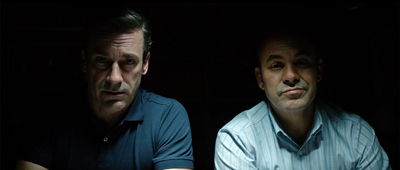 Moore offers, "I think that's what resonated with all of us is the idea that not only was this one individual's life was completely destroyed, but his mother, Bobi, instead of being able to be so proud of her son"which she was"had to see him treated as the most hated person in America. Because everybody hated him, and there was no reason to."
Moore offers, "I think that's what resonated with all of us is the idea that not only was this one individual's life was completely destroyed, but his mother, Bobi, instead of being able to be so proud of her son"which she was"had to see him treated as the most hated person in America. Because everybody hated him, and there was no reason to."
Early on, it was Moore who, on a location scout in Atlanta, approached Bobi Jewell and Watson Bryant in person on behalf of Malpaso. "When we mentioned that it would be Clint Eastwood directing the film, they were just real excited because they knew that Clint would tell the true story about what happened and show Richard as the hero that he deserved to be."
Facilitating the meetings between the actors and the real individuals was important to Eastwood as well. "In part it was to help Sam and Kathy better know who they were playing," Eastwood says.
"But also to make sure they were happy with what we were doing, for their sake and for Richard's, and to get their input. And to meet Paul Hauser, of course."
The director recalls the moment Bobi met the actor who would portray her son. "Watson and Mrs. Jewell were here at the studio, and our casting director brought Paul over. It was a bit of a shock for her because Paul does resemble Richard, but once she got past it, she knew he would be great for the part."
Bobi Jewell recalls the day vividly. "Watson and I flew to California about the first of May, and they took us for a tour of Clint Eastwood's office, and in one of the rooms they had Richard's picture on the wall, and then they had Paul's picture up, and I punched Watson and he looked at me and he said, 'Oh my God. He is so much like Paul.' And then I met Paul and I got the jeebie-weebies when I saw him. He evidently really watched those tapes, because he was even walking the way Richard did."
"Meeting Bobi Jewell was more intimidating than meeting Clint Eastwood because she's the mother of the man in question, and she could have been wary of me, or less than inviting," Hauser allows. "She was anything but, and that was the only validation I needed, that Richard's mother was happy with me playing her son."
Watson Bryant, who was equally supportive of Hauser's casting, says, "Richard was a regular guy who wanted to be a regular cop. Not Colombo or Dirty Harry or even a homicide detective, just a cop out in the world, on the road stopping drunk drivers and helping accident victims. He was a decent human being and definitely not the kind of guy that would put a bomb in a park. And Paul is amazing. He's captured Richard so well, when I look at him, he's not Richard but he's really close. His performance has had an impact on Bobi as well.
"He and Sam are both wonderful, they are just great guys and we got along really well," he continues. "The idea that we have these two pros, along with my favorite of all, Clint Eastwood, doing this movie, is just a mind-blowing situation. On the one hand, reliving it is very hard, but on the other hand, what I want for Richard"and what Richard deserves"is to be remembered as a hero. I couldn't ask for anything more."
AGENT SHAW
You always look at the guy who found the bomb, just like you always look at the guy who found the body.
During the FBI investigation, Bryant struggles to keep his client from aiding law enforcement in their efforts to dig up evidence against him. Richard tells Bryant he was raised to respect authority, but Bryant responds, "The authorities are looking to eat you alive."
Jon Hamm stars as Agent Tom Shaw of the FBI"not a real agent, but a fictionalized amalgamation of several who were there, created by the screenwriter to represent the agency's zealous pursuit under stressful conditions. "What's exciting to me about this story," Hamm says, "is that it took place over 20 years ago, yet in today's landscape it seems very relevant still. In 1996, when these events occurred, the 24-hour news cycle was pretty new, and the idea of everybody racing to break the story, to get the information out, was new as well. And now, we live in a time where that's accelerated ad infinitum, where an internet connection is all it takes to tell the whole world within seconds how you feel and have that echo chamber start. That makes it hard for cooler heads to prevail. And in the film, I play one of the guys who gets it wrong."
Despite playing a character who is very confident in his ultimately incorrect suppositions, Hamm says, "I know a lot of people in law enforcement, and they're often operating amidst the fog of uncertainty, trying to do the best they can to narrow down the pool of suspects, with pressure from both the public and the press and even other agencies. Information is going back and forth as fast as possible, and in this particular case, there was a lot of circumstantial evidence shaping their focus. It wasn't necessarily bad police work, but incomplete police work. 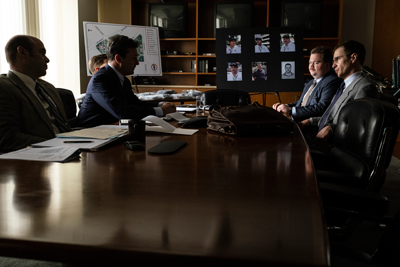 "The character I play, Shaw, has everyone jumping down his throat, and higher ups saying you need to clear this thing because the Games are going, and you can't call off the Games," he continues.
"The character I play, Shaw, has everyone jumping down his throat, and higher ups saying you need to clear this thing because the Games are going, and you can't call off the Games," he continues.
"It all happens on his watch, all this external pressure and the ticking clock, with everyone asking, 'Who's your guy?' So, when this guy comes along that ticks 85 percent of the FBI's boxes, Shaw thinks, 'That's our guy,' when what he really meant was 'That's our best guess.'"
Despite the FBI's"and Shaw's in particular"efforts to find real, hard evidence against Richard, they come up empty once Bryant is able to convince Richard to stop helping them and help himself. And though never charged with the crime, Hamm asserts, "Richard is tried in the court of public opinion anyway."
In the film, we see that public trial is due, at least in part, to Shaw's breach of confidentiality, as he shares information on the ongoing investigation with reporter Kathy Scruggs. Scruggs, who is based on the real journalist who broke the story, is hungry for a headline. When she learns that Jewell fits the lone bomber profile of a frustrated, white, wannabe policeman who seeks to become a hero, she jumps at the chance to have the first byline.
Oliva Wilde portrays Scruggs. "I was fascinated by the story as a study on how quickly we as a society jump to conclusions and the assumptions we make about people when we're desperate for answers. When the unimaginable happens"like this bombing, which wasn't all that long after the massacre at Munich"we as human beings look for the clearest first answer. That is not a good thing, especially when you're talking about the criminal justice system."
Wilde was eager for the role in large part because, she says, "I'm a child of journalists. My grandparents, parents, aunts, uncles, cousins… I have an immense respect for speaking truth to power for journalists, for their courage, and for how essential the first amendment is for our democracy."
In order to play the part of a woman Wilde describes as having been "incredibly dynamic and nuanced, brassy and sassy, brilliant and fearless," she tapped into the character's sense of obligation as "a journalist who feels that the public has a right to know, and that it is within her rights to report on an investigation based on evidence that she finds to be solid."
Although Hamm and Wilde play, as Hauser refers to them, "My antagonists on screen," he says, "working with Olivia and Jon"it doesn't get better than that. They're both so good at what they do, and they're very giving actors. There's no ego. They were almost like a really good brother and sister to me on the set."
To round out the main roles, the filmmakers cast Nina Arianda as Bryant's paralegal, Nadya Light"who would later, in real life, become Bryant's wife; Ian Gomez as Shaw's partner, Dan Bennet, also a fictionalized FBI agent; and Niko Nicotera as Richard's friend David Dutchess.
Eastwood states, "I thought all of the actors did a great job; even those in the smallest parts were right on key. They all took it upon themselves to research even deeper than what we had for them, and that pleased me because we were striving for that realism all the way down the line."
RICHARD
Need you to clear out.
Got a bomb scare in front of the tower.
Locations / Production Design / Camera / Costumes
Filming on "Richard Jewell" took place over the summer of 2019 in and around Atlanta, where the actual events occurred. As Eastwood says, "When you're telling a story about real people, you want to get it the way it was."
To ensure the film put forth an accurate physical representation of the truth, the filmmaker turned to his regular creative collaborators, cinematographer Yves Bélanger, production designer Kevin Ishioka, and supervising location manager Patrick O. Mignano, who, along with the producers, secured the rights to film in several of the real locations, including the site of the bombing, Centennial Park.
The massive undertaking to return the park area to the way it looked in 1996 included finding a three-to-four-week block of time during the city's busy summer season during which they could take it over and take it back in time. It was a challenge, but as it happened, the production was granted almost the exact timeframe that the Games were taking place in 1996. Ishioka and his team, who would need to recreate the Kenny Rogers and Jack Mack & the Heart Attack concerts"and crowds" that were happening when Richard Jewell was working security, brought in the original event planner, Rebecca Jones, to advise.
"With the amount of time we had, having Rebecca as our project manager, who was also the original event planner, was a godsend, because she had a lot of experience setting up these rock concerts," Ishioka says.
Among the designer's biggest challenges were the changes to the area's overall size during the ensuing two decades. "The park had been adjusted since that time period, so there was a lot of adaptation for us to do to the pavilion," he relates. "The actual stage had been shifted over by a good 100 feet, so we had to scale it down to fit in the smaller space. The footprint of the actual stage where the performances take place for the film is relatively accurate, a 40-foot by 40-foot platform, with all the lighting and the 20-foot by 20-foot LED panel that shows the performers live.
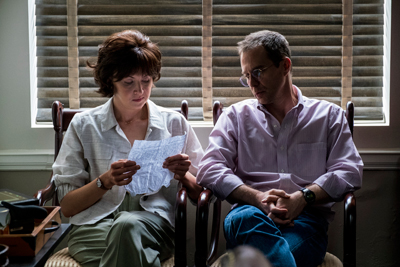 "That was unique," he continues, "because we had two different methods of showing the playback on the screen: the actual live feed with Kenny Rogers, and what was basically a video playback from the actual Jack Mack & the Heart Attack performance. We set up playback monitors so that our actors in the Jack Mack band had a visual reference and could mime the action from the real group."
"That was unique," he continues, "because we had two different methods of showing the playback on the screen: the actual live feed with Kenny Rogers, and what was basically a video playback from the actual Jack Mack & the Heart Attack performance. We set up playback monitors so that our actors in the Jack Mack band had a visual reference and could mime the action from the real group."
The AT&T Sound and Light Tower that is under Richard's purview in the movie is completely authentic, Ishioka assures. "All of the proportions of that venue had to be maintained because of the action inside, Richard going up and down to warn everybody. We duplicated everything, working off the original plans, so it's right on the money."
Eastwood appreciated his team's efforts. "Kevin, our art director, and everybody who came in to work on the Centennial Park set up rebuilt it to look just the way it was in `96, and I have to say it was as close as you could get. They did a great job."
"Being in the Centennial Park location on the anniversary of the bombing was pretty intense," Hauser reflects. "It was very strange and atmospheric to be there, and to feel the weight that we are telling the exact same story in the exact same place. And I looked at photos of the real location on the night in question, and it's identical. They really did a magnificent job of recreating that place and time."
Another real location the filmmakers were able to secure was the exterior of the apartment complex where Bobi and Richard Jewell resided in 1996. Due to the large press corps, news vans, and chaotic action required in the scenes, the production took over the building's entire parking lot for the three days they filmed there, arranging alternate parking and transportation to and from their apartments for the tenants who currently reside there.
The interiors were shot on a set, which Ishioka's team built utilizing the original floor plan, adjusting it somewhat to be, as the designer puts it, "more film-friendly. It's funny, because everybody who knew the original said ours was so much bigger, but I actually made it smaller. Of course, I referenced a few photographs so we could make sure the décor maintained the character and the care that she had for her place; she was very clean and very organized, and we tried to maintain the style she had for each room, so it felt like her."
Finally, the production was also able to secure Watson Bryant's 1996 law offices to film the scenes in which Sam Rockwell and Nina Arianda, as Nadya Light, are working when Watson receives Richard's call for help.
The design team recreated all other sets, such as the newspaper offices where Kathy Scruggs works, in each instance scouring to find architecture that was period correct, and then transforming it to the needs of the story. Ishioka says, "When you do the more contemporary time periods like the `80s and `90s, the toughest part is that most of the audience that is going to see the film will have a strong memory of what it was really like then"trends, colors, vehicles"so you can't stray, you really want to be accurate. Luckily my set decorator, Ron Reiss, is a total pro. He's a great partner, he gets the work done. For instance, he brought things into the AJC set like water coolers, period clocks, typewriters, all of which help tell our story in a space like that. The audience may not notice them, but they'll notice the authenticity of the scene. We all did exhaustive research because we wanted to show the utmost respect to the people who were involved then, to tell the story as it really was. That's the Eastwood way," he smiles.
Eastwood states, "Everything was the way it really was. Kevin, he's real thorough, he did a great job. During prep, he and his team kept sending me back film of what they were doing so I could watch their progress which I was preparing the story elements. And when I got to Atlanta, it was beautiful." Capturing it all for the camera fell to director of photography Bélanger and his team, including camera/Steadicam operator Stephen S. Campanelli, who has worked with Eastwood for 24 years. Bélanger says Eastwood provided him with one dictate: "'I want it to look like film noir.' And I said okay, great, because it's all about light, and I like to work with very few lights. This is about closing down the lens and creating contrast, it's black and white lighting but in color. And we played a bit with the Alexa cameras, and we have video for the Betamax look of the time, shooting with the same kind of square framing"the four-by-three, we call it"which makes it easy to match the older footage in post."
An additional realistic touch in the film was inspired by the actual footage of the FBI interrogation Richard Jewell went through. Moore says, "Ours almost mimics it, as far as the camera angles and the dialogue. Clint wanted that to be authentic so that anybody who sees this in the film and thinks it didn't happen or wonders if they really did this to Richard"it happened, they really did it to him. We're telling this story about an injustice to an individual, so you want to be absolutely accurate. If you look at the real tape, it's almost the exact same storyline that Clint followed." Costume designer Deborah Hopper conducted extensive research into the period in order to match the fashions of the era. Fortunately, her many years of working with Eastwood proved fruitful when it came to time to delve into the 1990s. "Malpaso's wardrobe department holds a lot of `90s clothes that I've collected over the years, so we pulled quite a few pieces and brought them to Atlanta," she says. Her favorite, though, came from her own closet. "Kathy Scruggs' clothes were a lot of fun for me. There was one outfit I actually wore myself in the `90s, a pair of high-waisted, pleated pants out of a creamy raw silk, with a cream blouse with those big Dolman sleeves, and my favorite belt. That silhouette was very true to the time and obviously looked great on Olivia Wilde."
For Sam Rockwell's character, Watson Bryant, Hopper says, "We did a flashback to 1986, when he was working for a more prominent law firm, wearing dress shirts and suits, things like that, and then jumped to 1996, after he's established his own practice. Then we have him in hiking shorts, a Polo shirt, Teva sandals…the kind of clothing he wears through most of the film." Throughout most of the time he is being investigated, Richard is seen in casual clothes, which he would have worn around the apartment. For the critical scenes at Centennial Park, Hopper says, "We were able to get clearance to recreate Richard's uniform almost exactly, so Paul Hauser wears what Richard Jewell and the other security guards wore, minus one of the logos."
The park sequences also called for hundreds of extras that Hopper and her team had to handle. "It was a lot, like 600 every day. And the Kenny Rogers band and the Jack Mack & the Heart Attack lookalikes." For the extras, she says, "Only a core group of them required multiples, in case they got dirty or bloody after the bombing. For most of them, having looked at the crowds in our research, it was casual"it was Atlanta in the summer, after all"so sundresses, shorts, t-shirts, anything you would have worn on a summer evening."
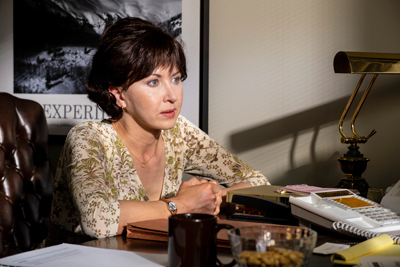 Hopper says that for the numerous extras they did not dress, "We sent out a flier telling them what to bring, no logos, that sort of thing. We checked them all, one by one, and if anyone looked too modern, we had a rack of clothes to switch out or add to what they already had."
Hopper says that for the numerous extras they did not dress, "We sent out a flier telling them what to bring, no logos, that sort of thing. We checked them all, one by one, and if anyone looked too modern, we had a rack of clothes to switch out or add to what they already had."
RICHARD
Three days, Watson. She's had THREE DAYS
to be proud of her son in her whole life.
Now this. It ain't right.
BRYANT
You ready to start fighting back?
Clint Eastwood's suspense drama "Richard Jewell" serves to finally reveal one man's truth, one man who, after 88 agonizing days"not one spent in jail"understands what it is to be guilty until proven innocent.
One of the filmmakers' driving forces in bringing Richard Jewell's story to the screen was that his mother, Bobi Jewell"who went through those same 88 days at his side"wanted her son's story told, his name cleared of any wrongdoing, his heroics at long last memorialized. When she learned it would be Eastwood at the helm, and then Hauser in the role, she felt Richard was in good hands both behind and in front of the camera. Her dream would soon be a reality.
Hauser offers, "I think this story is important because we live in a society where people play judge, jury and executioner before all the facts are known. Richard was tried in the media, and because of that, all the hard work he had done in his life"going to the police academy, coaching baseball, being a thoughtful citizen"was reversed with a headline. I think it's a bit of a reality check because we, today, haven't really righted these wrongs. It's still liable to happen to anyone. Hopefully, this film will make people careful about painting someone with a certain brushstroke, without acknowledging their humanity. Hopefully this film will serve to honor Richard's humanity as well as his good deed."
"Just a small amount of misinformation can turn someone's life into a nightmare, and when the truth comes out, nobody wants to face it, and that's a shame," Eastwood states. "Because it's never too late to celebrate our heroes, and if this picture gives Richard the recognition he deserves, I say it's about time."
Richard Jewell
Release Date: February 13th, 2020
MORE



